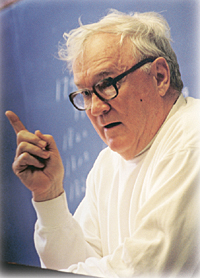
|
OBITUARIESJames P. Shenton '49: Passionate History Professor
James P. Shenton ’49, a
noted American history scholar who taught at Columbia
for more than 50 years, died on July 25 in Paterson,
N.J. Shenton recently had undergone heart surgery.
He was 78. James Patrick Shenton was born on March 17, 1925,
in Passaic, N.J. The oldest of four children, and
devoted to his mother, Lillian, now deceased, Shenton
attended public schools in New Jersey and served
as a medic with the Army’s 106th EVAC Hospital
in the European theater during WW II, caring for
wounded at D-Day, the Battle of the Bulge and the
liberation of Buchenwald. He often spoke of these
experiences in his classes and in talks to alumni
groups. Shenton commuted to campus, worked nights and earned his bachelor’s degree in three years. He earned his M.A. in 1950 and his Ph.D. in 1954 from GSAS and began teaching in the history department in 1951. He became an assistant professor in 1955, an associate professor in 1959 and a full professor in 1967. Shenton was a highly regarded historian of 19th- and 20th-century America with special expertise in the Civil War and Reconstruction, the history of radical movements, ethnicity and immigration, and World War II. He was a mainstay of the College’s Contemporary Civilization program and directed the history department’s summer session for many years. He also led summer seminars for college and secondary school teachers sponsored by the National Endowment for the Humanities. He served as departmental consultant, departmental representative and University senator. He also directed the history department’s summer session program for more than 20 years and helped found the Double Discovery Center (please see related article). Students often remarked on the passion, vividness and energy of Shenton’s lectures, though he never was content to remain behind a lectern. Shenton became a familiar sight in Chinatown, on the Lower East Side and at Ellis Island, leading his famous class tours of New York City and Civil War locations. He regularly taught more than a normal course load and continued to teach even after a formal retirement in 1996. In fact, Shenton supervised more Ph.D. dissertations than any other history professor. At Columbia, Shenton received virtually every award possible for a teacher and alumnus, including the Mark Van Doren Award (1971), the Great Teacher Award (1976), the John Jay Award for Distinguished Professional Achievement (1995), the Presidential Award for Outstanding Teaching (1996) and the Alexander Hamilton Medal (1999). The American Historical Association and the Society for History Education awarded him the Eugene Asher Distinguished Teaching Award in 1995. He was among the most requested speakers at College alumni events and reunions. Shenton’s published works include Robert John Walker: A Politician from Jackson to Lincoln (Columbia University Press, 1960), An Historian’s History of the United States (1967), American Cooking: The Melting Pot (Time-Life, Inc., 1973) and Free Enterprise Forever!: Scientific American in the 19th Century (Images Graphiques, 1979), and edited others, notably the eight-volume Perspectives in American History. In the 1960s, he taught a 76-hour survey course on public television, “The Rise of the American Nation.” A well-know supporter of liberal causes, and a pacifist from an early age, Shenton participated in the March on Selma in 1965, counseled draft resisters during the Vietnam War and was injured during the 1968 disturbances at Columbia when he attempted to intervene between police and protesting students. Beyond Morningside Heights, he devoted his services to everything from the Manhattan School of Music to the board of education in Passaic, N.J. to an adult education school in Montclair, N.J. Columbia will hold a memorial service on Thursday,
October 2; please check the College
website for further information. Donations in
Shenton’s memory may be made to the Columbia
College Fund for the Shenton Scholarship Fund. Please
send gifts to Susan Levin Birnbaum, Columbia College
Fund, 475 Riverside Dr., Ste 917, New York, NY 10115-0998. T.P.C., L.P.
|
|
|||||||||||||||||||||||||||||||||||||||||||||||||||||||||
